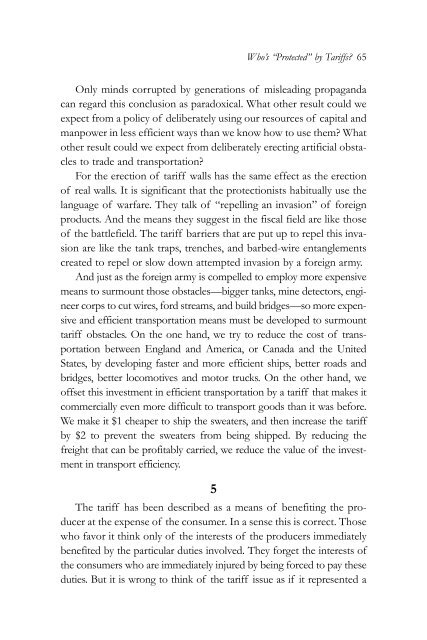1gDdM7w
1gDdM7w
1gDdM7w
- No tags were found...
Create successful ePaper yourself
Turn your PDF publications into a flip-book with our unique Google optimized e-Paper software.
Who’s “Protected” by Tariffs? 65Only minds corrupted by generations of misleading propagandacan regard this conclusion as paradoxical. What other result could weexpect from a policy of deliberately using our resources of capital andmanpower in less efficient ways than we know how to use them? Whatother result could we expect from deliberately erecting artificial obstaclesto trade and transportation?For the erection of tariff walls has the same effect as the erectionof real walls. It is significant that the protectionists habitually use thelanguage of warfare. They talk of “repelling an invasion” of foreignproducts. And the means they suggest in the fiscal field are like thoseof the battlefield. The tariff barriers that are put up to repel this invasionare like the tank traps, trenches, and barbed-wire entanglementscreated to repel or slow down attempted invasion by a foreign army.And just as the foreign army is compelled to employ more expensivemeans to surmount those obstacles—bigger tanks, mine detectors, engineercorps to cut wires, ford streams, and build bridges—so more expensiveand efficient transportation means must be developed to surmounttariff obstacles. On the one hand, we try to reduce the cost of transportationbetween England and America, or Canada and the UnitedStates, by developing faster and more efficient ships, better roads andbridges, better locomotives and motor trucks. On the other hand, weoffset this investment in efficient transportation by a tariff that makes itcommercially even more difficult to transport goods than it was before.We make it $1 cheaper to ship the sweaters, and then increase the tariffby $2 to prevent the sweaters from being shipped. By reducing thefreight that can be profitably carried, we reduce the value of the investmentin transport efficiency.5The tariff has been described as a means of benefiting the producerat the expense of the consumer. In a sense this is correct. Thosewho favor it think only of the interests of the producers immediatelybenefited by the particular duties involved. They forget the interests ofthe consumers who are immediately injured by being forced to pay theseduties. But it is wrong to think of the tariff issue as if it represented a


